Water Processing: New Method Eliminates Hormones
Hormones and other micropollutants adversely affect health when their residues enter the human body via drinking water. Widely applicable solutions for their removal, however, are still lacking. Karlsruhe Institute of Technology (KIT) has now developed a method, by means of which hormones are eliminated from wastewater rapidly and with a high energy efficiency. The results are reported in the Journal of Hazardous Materials.
A new membrane technology method developed combines the advantages of adsorption (binding) of micropollutants by an activated carbon adsorber manufactured by an industry partner with those of ultrafiltration of pollutant particles by a semi-permeable membrane. In the integrated system, the wastewater is first “pressed” through a polymer membrane in which the microorganisms and larger impurities are retained. Behind this membrane, a layer of special activated carbon is located, which originally was developed for air filters. Its surface has a high affinity to hormones, which means that carbon and hormone molecules readily form new compounds. Moreover, the activated carbon can be passed by large amounts of water and bind many molecules. The energy needed is far smaller than that of alternative methods, such as reverse osmosis.
Full Text: Press Release 058/2018
More Information
sur, 08.05.2018

